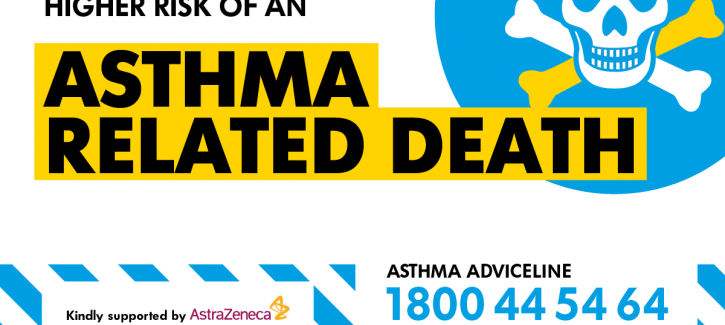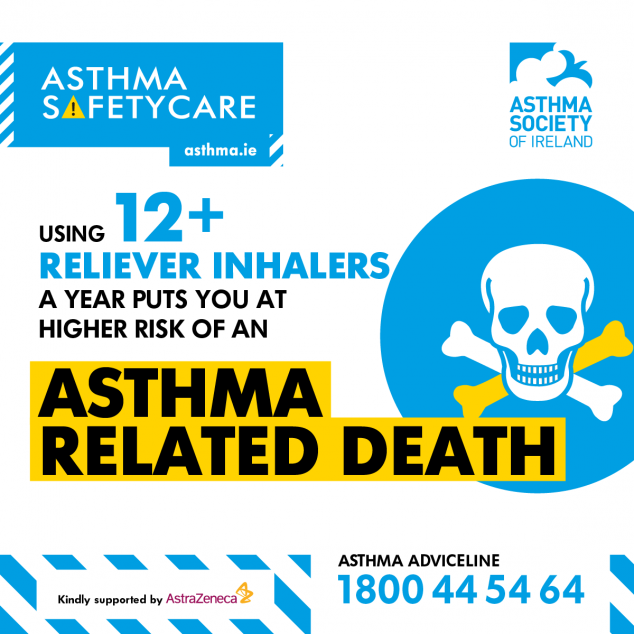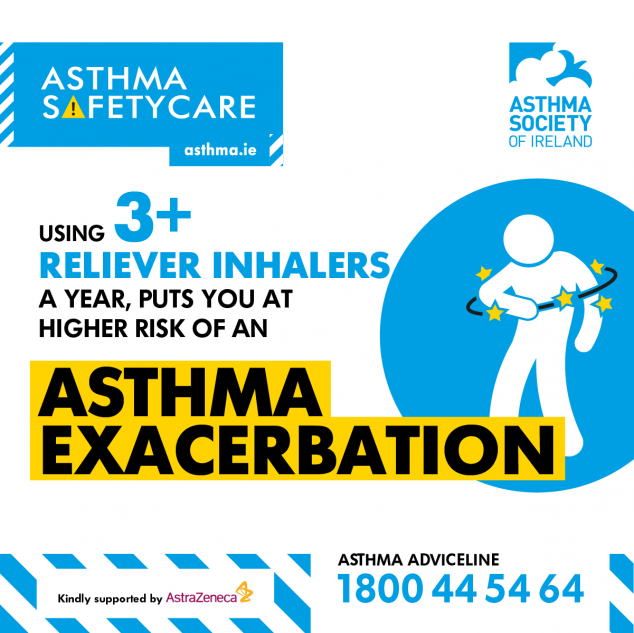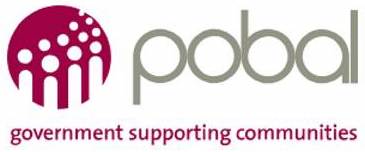
Three in ten use more than 12 reliever inhalers a year - putting them at risk of an asthma related death - Asthma SafetyCare Warning
Asthma Society warns of the dangers of over-reliance on reliever medication – i.e using a reliever more than twice a week (according to Global Initiative for Asthma)
The Asthma Society of Ireland is today releasing research carried out by hmR Ireland, which looks at the over-reliance on reliever inhaler medication by people with asthma in Ireland. Reliever inhalers, which most people will recognise as the blue inhalers, if over-used, are strongly linked with severe asthma exacerbations and asthma related deaths. An asthma exacerbation is an episode of progressive worsening of symptoms of asthma, including shortness of breath, wheezing, cough, and chest tightness and it can progress to a severe asthma attack.
Using three or more reliever inhalers a year indicates a person is at risk of an severe asthma exacerbation while the use of twelve or more a year is an indication someone is at risk of an asthma-related death, according to the Global Initiative for Asthma (GINA), a body tasked with evidence-based strategy for asthma management working to improve the lives of people with asthma in every corner of the globe.
hmR Ireland worked with 70% of Irish pharmacies in 2019, conducting research on asthma medication usage trends, using anonymised patient transactional dispensing data.
The Health Market Research results found:
- Three in ten use more than 12 reliever inhalers a year, putting them at risk of an asthma-related death
- Seven in ten are using more than three reliever inhalers a year, putting them at risk of an asthma attack (or some form of asthma exacerbation)
- Within five years of diagnosis, half the asthma population are over-reliant on their reliever inhaler
- In the year after diagnosis, 30% children aged 0-17 are overusing their reliever inhaler
- In the year after diagnosis, 60% people aged 50 or over are overusing their reliever inhaler
Sarah O’Connor, CEO of the Asthma Society of Ireland, said: “International research shows that reliever inhaler overuse can be a major factor in asthma exacerbations and asthma related deaths, as in the UK’s National Review of Asthma Deaths report and GINA’s Global Strategy for Asthma Management and Prevention. This makes the findings of this hmR Ireland research about Irish patients relying on their reliever inhaler stark and very worrying to us. One person dies every six days from asthma in Ireland.
Today’s hmR research revealed that a huge proportion of people in all age groups are overusing their reliever inhalers in every county throughout Ireland, putting them at risk of an asthma severe exacerbation or asthma related death. Alarmingly, within five years of diagnosis, half of people become over-reliant on it. As people with asthma get older, their rate of over-reliance increases, resulting in increased levels of uncontrolled asthma. A key point at which people become over-reliant on their reliever inhaler is between year one (year of diagnosis) and year two. This “year two” of asthma is when the largest increase in inhaler over-reliance occurs and we need healthcare professionals to know this so that they can intervene to help and support their patients to have the best possible asthma management.
If you are using your reliever inhaler several times each week, you are over-reliant on it and your asthma is not controlled, according to the Global Initiative for Asthma. The exception to this is people with asthma who participate in sport/exercise, it is still recommended you use your reliever inhaler prior to warming up before exercising.”
The Asthma Society is calling on all people who are over-reliant on their reliever inhaler to act now to get their asthma in control. People with asthma should take the following actions:
- Download an Asthma Action Plan from asthma.ie
- Complete your Asthma Action Plan with your healthcare professional and speak specifically about your asthma medications
- Call the Asthma Society’s free Asthma and COPD Adviceline on 1800 44 54 64 to help you understand asthma, its triggers and how to manage it, and to better understand your asthma control
The Medical Director of the Asthma Society of Ireland, Marcus Butler, said: “A reliever inhaler works within minutes to relieve asthma symptoms when they happen - it gives a short-lived improvement in symptoms, effectively just buying time, but can eventually fail to keep a patient safe from asthma if more appropriate and effective controller inhalers are not used on a daily basis. A controller inhaler works over a much longer duration than reliever inhalers to eventually ease the underlying airway inflammation which ultimately causes asthma symptoms. It prevents symptoms from arising several weeks and months down the road, as long as it is habitually taken.
The UK’s National Review of Asthma Deaths report (2014) showed that there was evidence of excessive prescribing of reliever medication: 39% of those who died had been prescribed more than 12 short-acting reliever inhalers in the year before they died, and 4% had been prescribed more than 50 reliever inhalers. Those prescribed more than 12 reliever inhalers were likely to have had poorly controlled asthma.”
- In the first year after diagnosis, there is: a 6% increase in the number of people using 12 or more reliever inhaler a year (2% to 8%) and a 17% increase in the number of people using three or more reliever inhalers per year (16% to 33%). There is a corresponding drop of 23% of people using two or less (considered the appropriate amount) reliever inhalers per year (82% to 59%).
- In the year after diagnosis the following numbers of people over-use their reliever inhaler: three out of 10 people aged 0-7, three out of ten people aged 7-17, two out of five people aged 18-32, half the people aged 31-50, and three out of five people aged over 50.
Asthma Overuse by County:
- Carlow 56%
- Waterford 53%
- Limerick 53%
- Dublin 52%
- Monaghan 52%
- Tipperary 52%
- Offaly 52%
- Longford 51%
- Louth 51%
- Leitrim 51%
- Clare 51%
- Westmeath 50%
- Kerry 49%
- Roscommon 49%
- Cork 48%
- Cavan 48%
- Wexford 47%
- Galway 47%
- Sligo 47%
- Wicklow 46%
- Mayo 45%
- Kildare 45%
- Laois 44%
- Kilkenny 44%
- Meath 43%
- Donegal 43% *This graph shows the rate of overuse of reliever medication per county after five years of being prescribed an inhaler.
For anyone with asthma, or for anyone who cares for someone with asthma who would like to speak to someone about their inhaler usage, the Asthma Society of Ireland runs a free Asthma and COPD Adviceline. Users of the service can speak to a respiratory specialist nurse who will work with them to assess if they are overusing their reliever medication and review their asthma control. The free Asthma and COPD Adviceline is available on 1800 44 54 64.
For healthcare professionals looking to learn more on the new GINA 2019 Update and what they should be prescribing, the Asthma Society of Ireland will be hosting a webinar in February to answer any questions on the new GINA Guidelines and on how to recognise SABA over-reliance in patients.


ENDS
For Media Queries:
Contact: Pauric Keegan – 086 866 0684, 01 554 9203 or on Pauric.keegan@Asthmasociety.ie
About Global Initiative for Asthma (GINA)
GINA works with health care professionals and public health officials around the world to reduce asthma prevalence, morbidity, and mortality. GINA was launched in 1993 in collaboration with the National Heart, Lung, and Blood Institute, National Institutes of Health, USA, and the World Health Organization. GINA’s programme is determined and its strategies for asthma care are shaped by committees made up of leading asthma experts from around the world.
The GINA Scientific Committee prepares updates to these documents each year, which are made available on the GINA Website as they are completed. The Scientific Committee has developed a sophisticated set of procedures to review the world’s literature with regards to asthma management and to update the GINA documents to reflect this state-of-the-art information.
About National Asthma Review of Deaths Report, 2015 (NRAD) - “Why asthma still kills”
The 2014 UK National Review of Asthma Deaths obtained identifiable clinical information on 628 people who died from asthma in the UK, by examining medical records containing sufficient information for analysis. The report identified potentially preventable factors in two thirds of the medical records of cases scrutinised. Based on the NRAD evidence, the report made 19 recommendations for change.
One key finding in the report identified “prescribing issues; with overprescribing of short-acting reliever inhalers (SABA) and insufficient provision of inhaled corticosteroid preventer medication” as a factor in asthma-related deaths and the report recommended that:
“All asthma patients who have been prescribed more than 12 short-acting reliever inhalers in the previous 12 months should be invited for urgent review of their asthma control, with the aim of improving their asthma through education and change of treatment if required.”
About the Asthma Society of Ireland
The Asthma Society of Ireland was founded in 1973 to help raise public and political awareness of the condition and the challenges faced by asthmatics on a daily basis.
Today, we are a national charity dedicated to empowering Ireland’s 380,000 people with asthma, to take control of their condition by providing them and their families with information, education, services and support.
About the Asthma Society’s Free Asthma and COPD Adviceline
The Adviceline is proven to have a truly positive impact on people with asthma, with appointments tailored to the needs of each caller. The Adviceline respiratory specialist nurses work through every aspect of life with asthma: what to do in the event of an asthma attack, answering questions after a GP or consultant appointment, dealing with triggers that may be bringing on asthma symptoms, and helping users put together an Asthma Action Plan to self-manage their condition. After speaking to one of the adviceline nurses, users will be fully equipped with the information and skills they need to improve their health and stay as well as possible
Callers can book a free call back appointment by calling the free phone number between 09:00 and 17:00 Monday to Friday. The Asthma Society facilitates a call back from the nurse at a time that suits the patient.
In 2019, the Asthma/COPD Adviceline was awarded an independent quality mark by the Helplines Partnership, one of only three helplines in Ireland to have achieved this standard.
About Asthma
Asthma is the most prevalent chronic disease in Ireland. It is a condition that affects the airways, which carry air in and out of the lungs. In asthma, the airways become oversensitised, reacting to things that wouldn’t usually cause a problem, such as cold air or dust. These are called triggers and can lead to an increase in asthma symptoms.
It is extremely important that preventative medication is taken regularly, as prescribed and even when asthma symptoms are not present. 60% of Irish people do not have their asthma under control. Failure to recognise triggers and control asthma can prove fatal. Asthma deaths are rising in Ireland – one person dies every six days from asthma.
About hmR Ireland
hmR Ireland is a data analytics and consultancy company specialising in the generation of market knowledge and innovative insights for the Healthcare Industry. Its ambition is to provide the highest level of support for organisations’ business decisions.
hmR is continually searching for and collecting information from the best sources, as a result more than 70% of Irish pharmacies are now partnering with hmR. Transactional Sell-Out data provides the most suitable and reliable data which organisations can choose to analyse markets, representing the actual products dispensed to patients, independent of the distribution channel.


